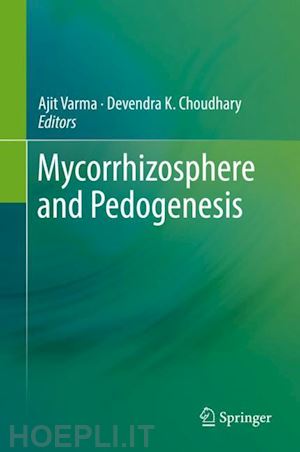

Questo prodotto usufruisce delle SPEDIZIONI GRATIS
selezionando l'opzione Corriere Veloce in fase di ordine.
Pagabile anche con Carta della cultura giovani e del merito, 18App Bonus Cultura e Carta del Docente
The present book highlights importance of mycorrhiza in soil genesis wherein it reflects mycorrhizal occurrence and diversity, various tools to characterize them and its impact on soil formation/health together with crop productivity. The edited compendium provides glimpses on the mycorrhizal fungi and their prominent role in nutrient transfer into host plants, and presenting view on application of mycorrhiza for crop biofortification. It focuses on the mechanisms involve in weathering process employed by mycorrhiza with highlighting the current and advanced molecular approaches for studying mycorrhizal diversity. Further, book emphasizes following aspects in details: significance of AMF in phytoremediation of hydrocarbon contaminated sites, the role of mycorrhiza in soil genesis using scientometric approach, the concept of mycorrhizosphere, xenobiotic metabolism, molecular approaches for detoxifying the organic xenobiotics and the role of mycorrhizosphere in stabilizing the environment in an eco-friendly way. In addition, the book will be benign to researchers that involved in mycorrhiza characterization especially by deploying metagenomics/PCR based and non PCR based molecular techniques that may be utilized to study the microbial diversity and structure within the mycorrhizosphere.
Prof. Dr. Ajit Varma Dr. Varma completed his M.Sc. (1959) & Ph.D. (1964) degrees at Allahabad University, Allahabad, India. In the course of his professional career, he has also served as a Microbiologist (Assistant Professor), IARI, New Delhi (1963-1971), Senior Microbiologist (Associate Professor), IARI, New Delhi (1971-1974), Associate Professor, JNU, New Delhi (1975-1984), and Professor, JNU, New Delhi (1985-2004). He has been a visiting professor & visiting research scientist at the Technical University, Graz (Austria), University of Tuebingen, Tuebingen (Germany), Friedrich Schiller University, Jena (Germany), Philipps University, Marburg (Germany), Technical University, Munich (Germany), Kingston (Jamaica), Max Planck Visiting Professorship (Germany), Helmholtz Zentrum, Muenchen (Germany), Gutenberg University, Mainz (Germany), CSIC, Madrid (Spain), University of Dundee (Scotland), University of Ljubljana (Slovenia), and ICGEB (Italy). His international awards/fellowships include the Commonwealth Fellowship (Australia), National Research Council (Canada), Alexander von Humboldt Foundation (Germany), National Science Foundation (USA), Indo-Czechoslovakia Exchange Programme (Prague), DAAD Fellowship (Germany), and the Deutsches BMFT Programme, George-August University, Gottingen (Germany), RAISA. He was awarded a fellowship for Innovative Research in Biotechnology (Italy), Swiss Federal Research Fellowship (Switzerland), the BP Koirala award (Nepal) and DFG-INSA Fellowship (Indo- Germany), as well as the FAMI Award-Association of Microbiologists of India and Honorary Diploma, UMF, Cluj-Napoca, Romania. Dr. Varma has successfully completed major projects as PI sponsored by DBT, DST, DRDO & ICAR. Besides, he has supervised more than 60 PhD students and published over 300 research articles for national and international journals of repute, as well as several major review articles and chapters in books. He has published 90 books in the area of Microbial Technology, published by Academic Press, London, CRC Press, Florida, USA, IDRC, Canada and Springer-Verlag, Germany.
Dr. Varma has been the series editor for Springer-Verlag’s Series on Soil Biology, and has edited fifty volumes on Soil Biology. He was also nominated as Editor-in-Chief by IK Internationals to make series of books on Microbial and Biotechnological Research. Dr. Varma has been a member of the National Academy of Agriculture Sciences (FNAAS), International Society of Symbiosis, Boston, USA, Indian Science Congress Association, Executive Council, Amity University Uttar Pradesh, University Research Council, Amity University Uttar Pradesh, Academic Council, Amity University Rajasthan, ASSOCHAM Knowledge Millennium Council, ASSOCHAM Expert Committee on Agriculture and Food Processing, and ASSOCHAM Expert Committee on S&T and Innovation. He has vast experience in organizing national and international training workshops/symposia and congresses.
Dr. Devendra K. Choudhary Dr. Choudhary has 16 years of research experience in Microbiology & Microbial Biotechnology, Dr. Choudhary shows his presence at Amity Institute of Microbial Technology (AIMT) as Associate Professor. Recently he was associated with PDM and worked as Professor (Ad hoc) for three months. Before joining Amity University he spent several years in Mody University of Science & Technology (MUST), Lakshmangarh, Rajasthan preceded by Barkatullah University, Bhopal as Lecturer cum scientist. He pursued PhD in Microbiology on July 11, 2005 from GB Pant University of Agriculture & Technology, Pantnagar preceded by MSc in Microbiology from MDS University, Ajmer and qualified CSIR-UGC-NET in 2002. He is active researcher and operated major projects with worth amount 10 million sponsored by DBT, DST and SERB, New Delhi, India, as principal investigator and co-investigator. He has involved and contributed in NAAS policypaper number 36 in the year 2006. He has published more than 80 research/review articles along with several book chapters for reputed journals and edited books (Springer, Elsevier and Taylor Francis/Wiley-Blackwell). He has supervised/supervising 11 research scholars for their doctoral programme as supervisor and co-supervisor and wherein 7 have been awarded at MUST and four ongoing at AIMT. In addition, he is recipient of NASI-membership 2016 along with Indian National Science Academy (INSA) visiting and summer research fellowship-2014 and his team received DR. RS Rana Memorial best research award 2013 sponsored by Association of Microbiologists of India. His team submitted bacteria to public domain and incurred two accession numbers from MTCC, IMTECH for submitted bacterial cultures (MTCC, 12057 & 12058) along with one MCC no 2607. Besides, his team submitted appx. 25 functional bacterial genes and 80 I6S rDNA sequences to NCBI with Accession Numbers. In recent times, he has edited7 b











Il sito utilizza cookie ed altri strumenti di tracciamento che raccolgono informazioni dal dispositivo dell’utente. Oltre ai cookie tecnici ed analitici aggregati, strettamente necessari per il funzionamento di questo sito web, previo consenso dell’utente possono essere installati cookie di profilazione e marketing e cookie dei social media. Cliccando su “Accetto tutti i cookie” saranno attivate tutte le categorie di cookie. Per accettare solo deterninate categorie di cookie, cliccare invece su “Impostazioni cookie”. Chiudendo il banner o continuando a navigare saranno installati solo cookie tecnici. Per maggiori dettagli, consultare la Cookie Policy.